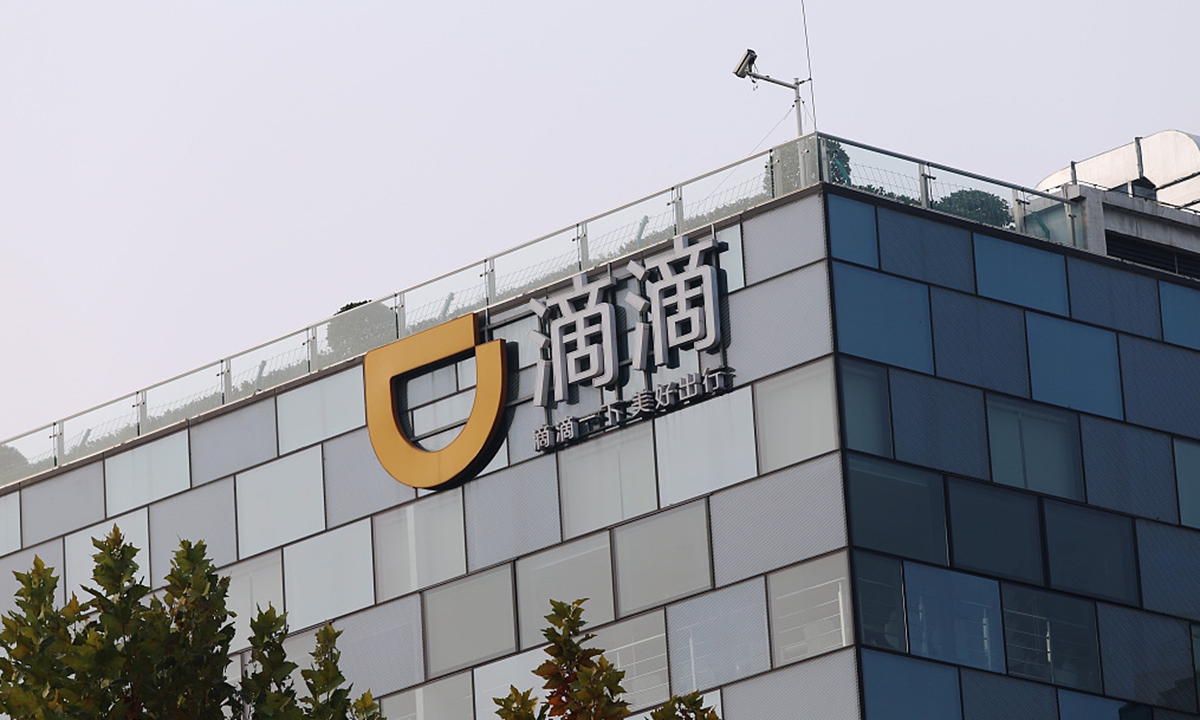Why Didi started delisting right after US securities mandate: Global Times editorial

The headquarters of DiDi in Beijing Photo:VCG
Didi Chuxing, the Chinese ride-hailing giant, announced Friday that the company is starting the work of delisting from the New York Stock Exchange (NYSE) and initiating preparations for listing in Hong Kong. One day before Didi made the statement, the US Securities and Exchange Commission (SEC) issued a mandate requiring foreign companies listed in the US to provide audits for inspection. Otherwise, they could be delisted from NYSE and Nasdaq in three years. The new SEC regulation clearly targets Chinese companies listed in the US. Analysts believe that it could lead to more than 200 companies being kicked off US exchanges.
Didi is the first Chinese company which announced it would delist from the NYSE after the SEC issued its new regulation. The company got listed in the US in June without the approval of Chinese regulatory authorities, sparking concerns that the information of hundreds of millions of Chinese users would be leaked to endanger China's national security. More than 20 apps linked to the company were subsequently removed from mobile stores. The SEC's new regulation has compressed Didi's space for financing in the US from the other direction.
In recent years, China-US relations have been going downward because of the US unilateralism. Strategic distrust between the two countries continues to expand and erode the scarce mutual trust. The trade war, technological war and geopolitical containment launched by the US against China came one after another and even jeopardized the foundation and atmosphere of financial cooperation. There have already been voices in the US demanding most of the "China concept stocks" be removed from the US. Scrutiny of "China concept stocks" is expected to get stricter. The US provides various excuses such as "financial security" and "national security" for such scrutiny.
China-US relations are highly interactive. US hostility toward China is bound to increase China's consideration of national security as it interacts with the US. China has to stay alert toward US maneuvers. Competition between China and the US over national security is spiraling upward. This means the two will become more careful about cooperating in sensitive areas, and the space for cooperation will further shrink.
It will become more difficult for Chinese digital technology and application companies to get listed in the US in the future. This will cause losses to both sides. But the tendency shows that China has greater initiative to adjust and adapt to new conditions. Wall Street is the place where capital is most concentrated. It's the world's biggest capital market. However, China is the new engine for global development, and a holy land to create wealth and provide the most investment opportunities. In general, what is most lacking in the world is not capital, but impetus and opportunity.
We hope China and the US could properly manage mutual distrust in the financial investment field, straighten out conditions for ensuring their respective national security, and seek the rational boundary for keeping financial cooperation going on. In that way, US investors will have more opportunities to share China's development dividends, and Chinese enterprises will have more channels for financing. This will be a win-win structure.
However, if the US sets unequal conditions on national security for competition between the two countries by demanding Chinese listed companies hand over audits for inspection so as to spy on China's internal situation and store huge amounts of sensitive data acquired by Chinese companies, China won't accept that.
If the US loses Chinese companies, Wall Street will gradually alienate itself from the world's most prosperous market and the US will no longer be the true global financial center. Chinese companies have other alternatives, and if they go back to China, they will greatly enhance the attractiveness of the mainland and Hong Kong capital markets, creating the possibility of gradually changing the global financial landscape.
That Chinese companies go to list in the US is not a favor they ask the US to grant. A key school needs excellent students, and China has the most excellent and promising students and these students are competitive. If they stay in the Chinese mainland and Hong Kong, the Chinese mainland and Hong Kong may become the places that harbor key capital schools. More importantly, we need to produce more excellent students and accelerate the pace of improving the capital market to make China become more mature in the financing sector and unleash its financial potential as the world's factory.

